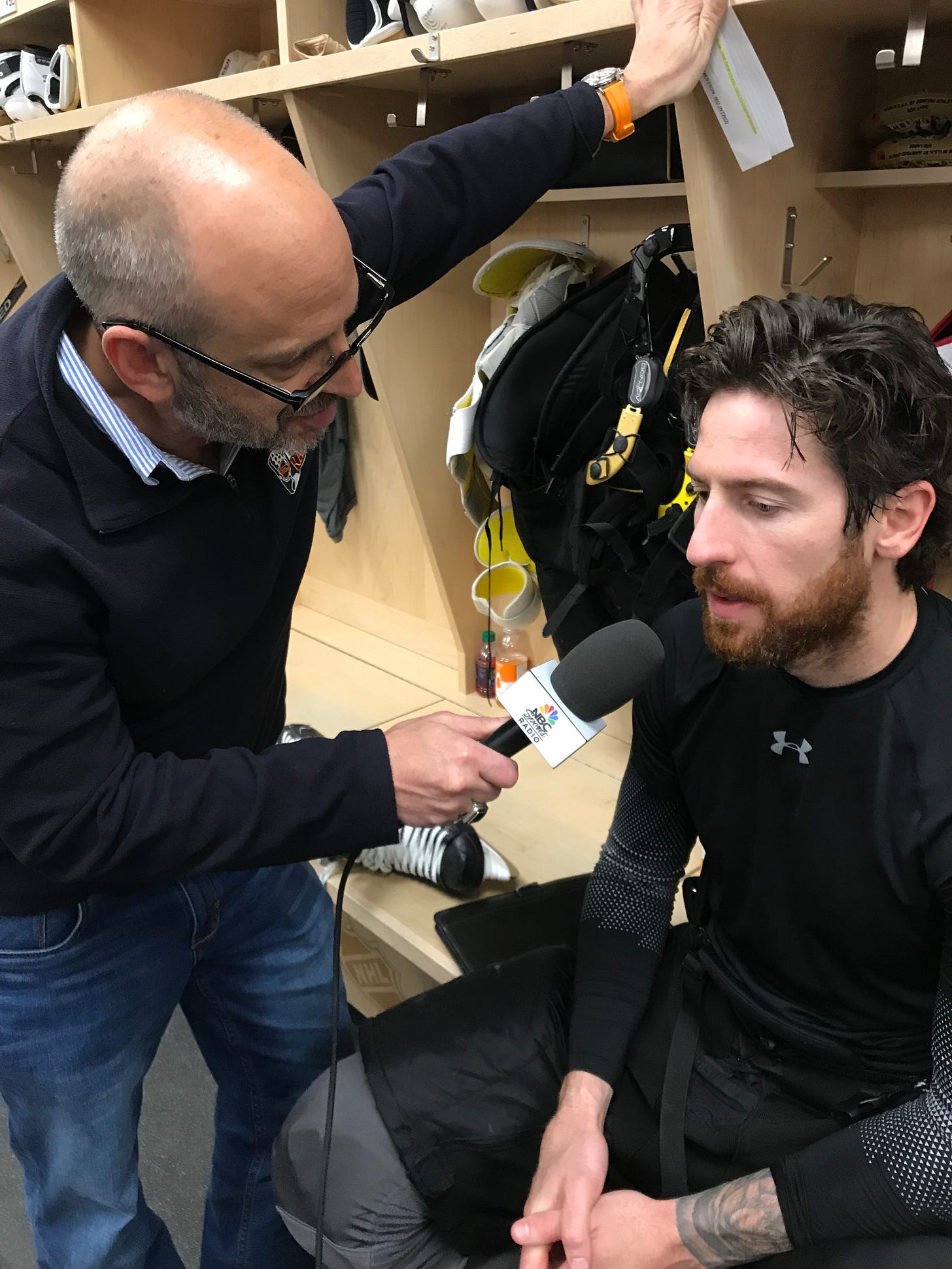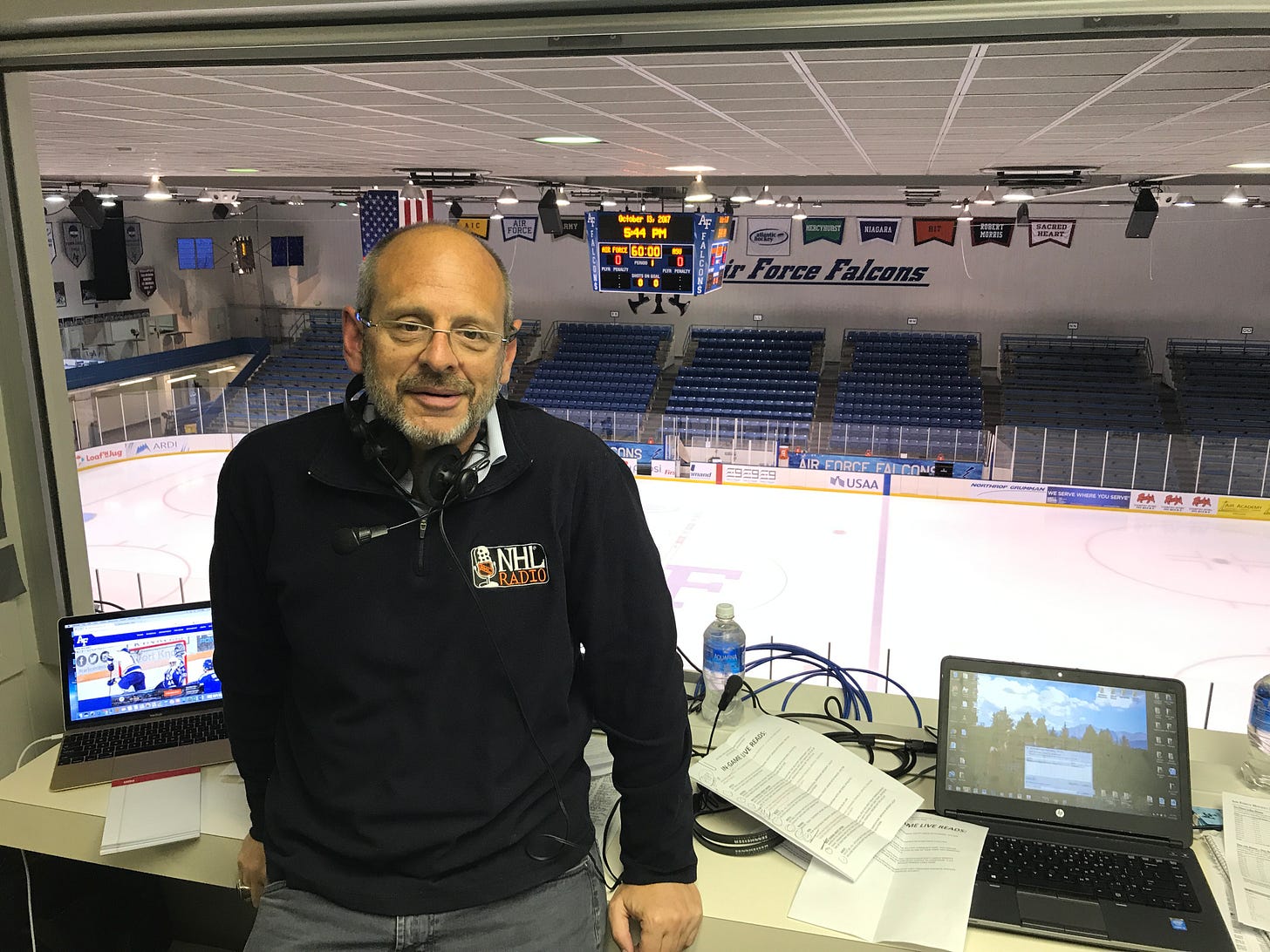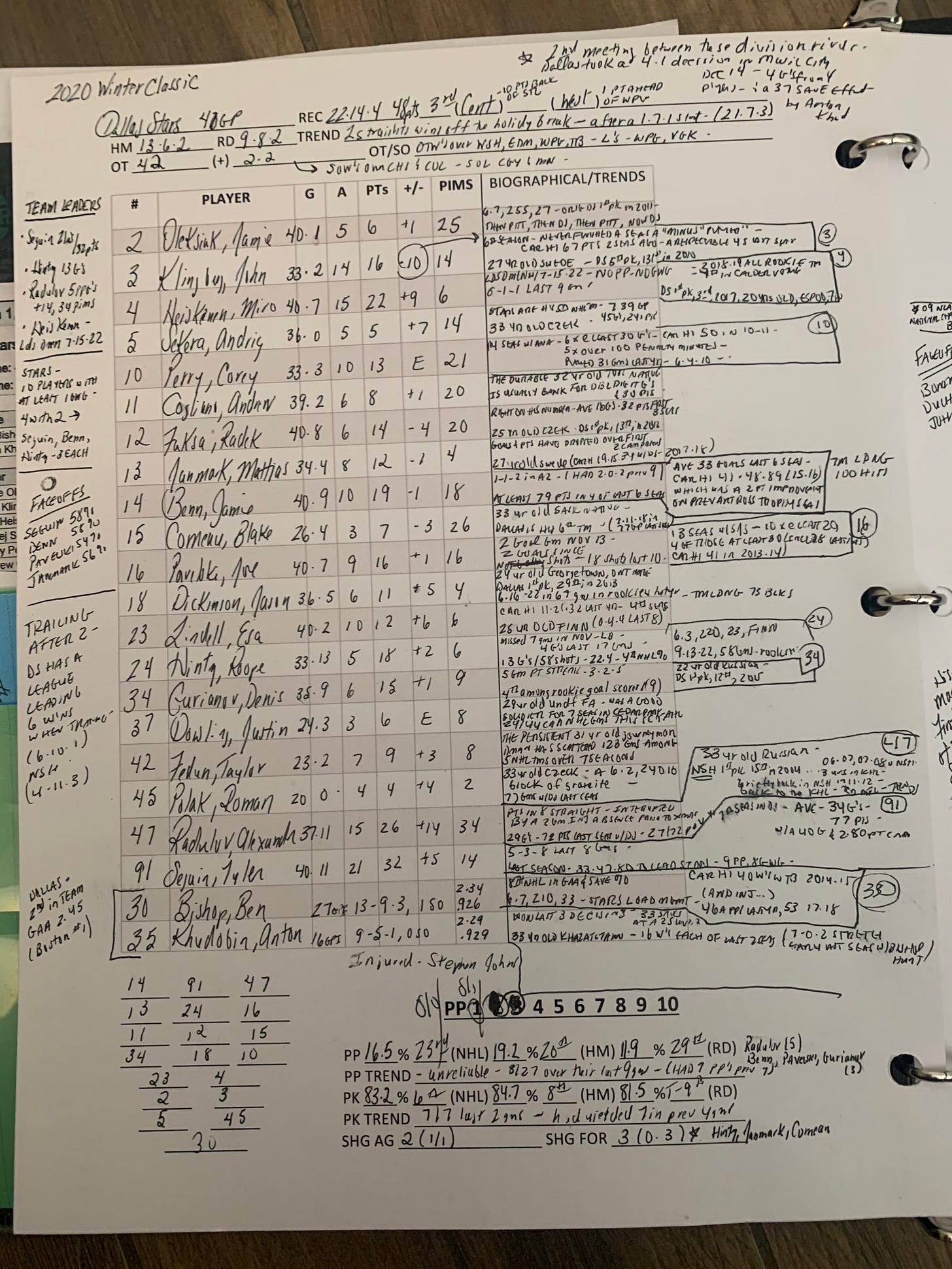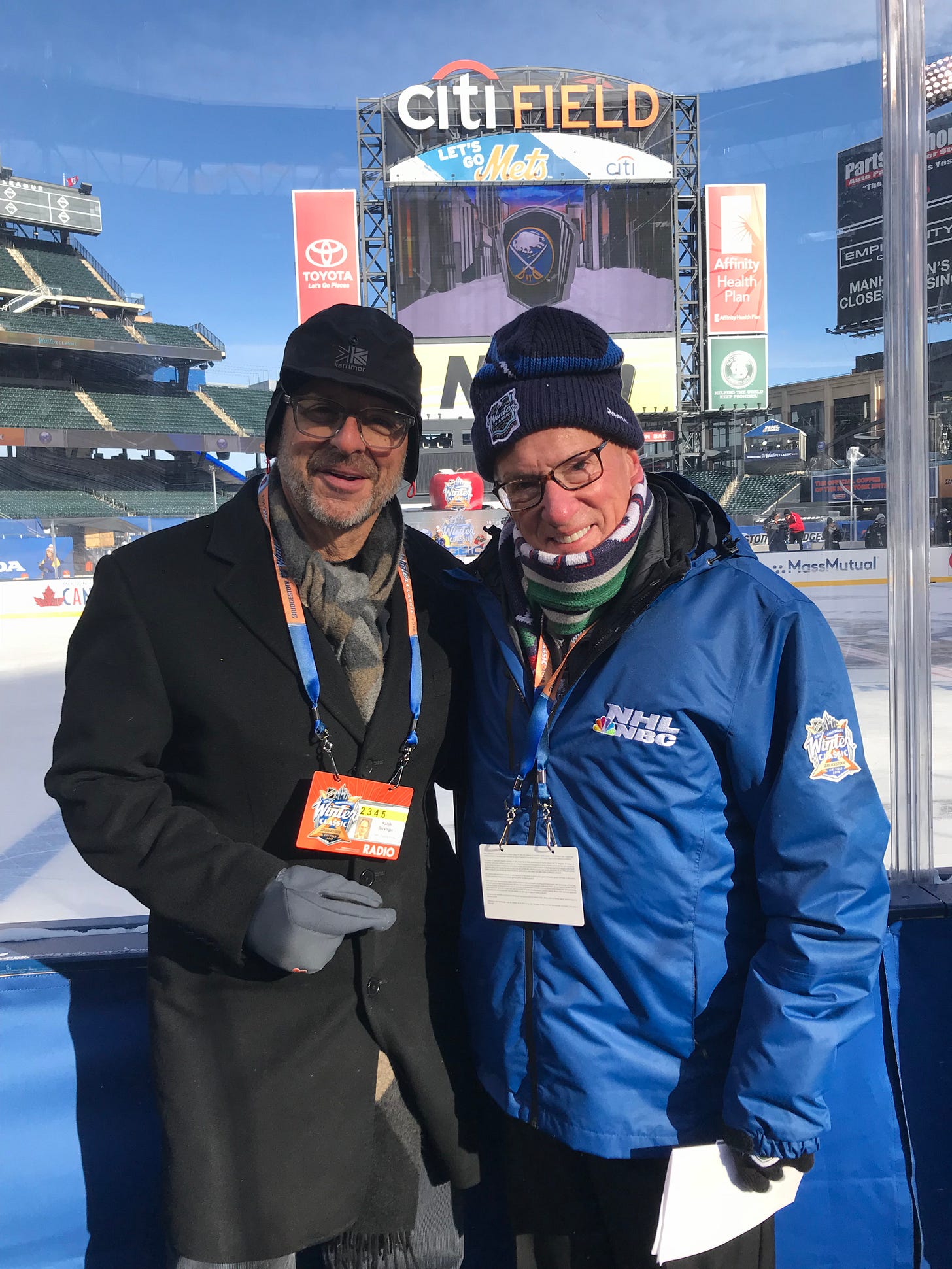Advice for young sports broadcasters - Part 3
This week - setting yourself up for success - and - the right and wrong people to listen to.
Continuing Education for Sports Broadcasters
In this week’s “Advice” post - we’ll go over a couple of interconnecting areas for you to think about and solid tips to integrate better habits and awareness around your work and career.
First - How good are you at something you’re not doing every day? Are you getting daily reps (either live or in a practice setting) to sharpen your skills and learn your craft. With that comes setting up great habits that will follow you wherever you go. This part of the post is great for anyone getting into anything for the first time.
Alongside this goes - how do you evaluate yourself? And as important - there will be no shortage of people around you in your job who - despite not having any experience doing what you do - will be happy to tell you what you’re doing wrong and where you need to go for answers. We’re gonna tune them out and discuss where feedback should come from based on my own (yikes…) experiences of everything from direction following fan surveys to anonymous committees of people rating your work.
First a quick review of Parts 1 & 2 (Access below)
ALWAYS SAY YES - take every gig - no matter what the sport, no matter what it pays - no matter who it’s for. Saying YES opens doors. Saying NO closes them - maybe for good.
NOTHING GETS DONE YOU DON’T PUSH - BE RELENTLESS - be prepared to go through walls or break windows to get opportunities. The world is lazy - you can’t be. Push. Push harder. Push again.
YOU GOTTA KILL THE JOB YOU HAVE TO GET THE JOB YOU WANT - Don’t look over the fence - crush what you’re doing now - it’s the best way to get better and open yourself up for other opportunities.
GET AN AGENT - get someone between you and management - you don’t negotiate contracts for a living - management does. You don’t have access to all the information you need - management does. Most everyone is fine with this now - it avoids bad feelings or worse during the negotiation. If they’re not fine with it - start thinking about going or looking elsewhere.
So Now - let’s go with Part 3 - AND THESE POSTS FOR YOUNG SPORTSCASTERS WILL NOT GO BEHIND THE PAYWALL - I want anyone who wants the information to get it for free.
HOW GOOD ARE YOU AT SOMETHING YOU’RE NOT DOING EVERYDAY?
Simple question - easy answer. Hard to execute.
Everything for me is automatic now, and that comes by daily practice and daily training over many many years. The last NHL game I called was Dec 18, 2021, (The Last Rodeo - SubStack piece coming that week to tell you what happened and why it was so important and memorable) but if I decided to do another one - (I won’t…) I’d go right back into my bag of habits that I continue to practice and get ready for it.
I still “shadow call” TV sports - especially hockey - just for exercise. It’s fun now - I was quick - that was one of the things I’m most proud of - and so even off the monitor I scan away from the puck and try and get to the call before the guy or gal on TV. I’m still quite competitive… :)
Out of habit I do this - I’ve always done it even before I got into the business professionally. I drill names and numbers - I memorize license plates in parking lots, I memorize and recite long passages from books - or poems - or scripts. My head is still sharp and I keep exercising it. Every day.
And I had to put into motion other things I would track and research every day to get better. I have a routine of what sites I go to first thing in the morning (still), what and who I read, what stats I’m tracking.
I have a schedule even now and once on it - it’s almost impossible to deviate.
The roster board above is of my own creation (we all have our own ways of keeping track or setting up our boards and notes).
During my NHL broadcasting career I got to the point where everything was automatic - it has to be for you - and no time like the present to start.
Game days were tightly scheduled to give me time to prep, memorize numbers and lines and d pairs, and guide me right up to warmups - the most important part of getting ready for the game. I’d watch - calling warmup action in my head - I’d turn to the Dallas side and do a few - then quick jump to the opponent and do more. As an aside - our group in Dallas was great about scheduling pre-game hits around this - I had to watch warmup.
In short - MY GAME DAY ROUTINE INCLUDED DAILY PRACTICE ON MY CRAFT BEFORE THE GAME EVEN STARTED.
And look - if you’re not so into it that you’re not working on this every day - you’re in the wrong business.
Great car mechanics worked on their own cars and their friends cars in the driveway and nobody had to tell them to. Artists paint or sculpt or create. Writers write everyday. Athletes train every day - or at least have tightly scheduled processes. Nobody should have to tell you to be enthusiastic about what you’re doing. If they do….

GET REPS WHERE YOU CAN!!
Early on - in my teens - I’d go out to local sports games with a tape recorder to practice. When I was 16 I got my first professional paying radio job. Monday to Friday spinning records - tracking commercials - reading promos, the weather, all of it. I took EVERY local college and high school game of any sport anyplace just to get the reps. I practiced interviewing my friends and family when I was a kid.
Good habits are as hard to break as bad ones…
If you think you’re gonna get out of school AND THEN - because someone is paying you - show up on time and get your work done - YOU’RE KIDDING YOURSELF. You’re not long for the world.
Start this TODAY. RIGHT NOW.
I don’t care where you are or what you’re doing - you have to get these things down and into a system.
You have to practice showing up on time - it doesn’t just happen.
You have to practice interviewing, writing copy, reading scripts, calling action every day - you’re not gonna get as good as you can if you don’t.
Once you set the habit of doing this - good luck trying to break em.
Mine still stay with me. I’m early everywhere I go. I’m prepped even if I’m just betting or watching a game. I keep in it. Not because I wanna go back in - but because now - I have no choice - I’ve programmed myself to be this way.
So - organize your month - your week - and your day to include daily practice on your craft - and for putting in time to develop your systems for HOW you study - WHAT you study - and WHEN you study and practice.
Once in there - they’ll stay in there. But you gotta do it.
BE CAREFUL WHO YOU LET CRITIQUE YOUR WORK OR GIVE YOU FEEDBACK OR ADVICE…
“Anything in any way beautiful, derives it’s beauty from itself… Praise is no part of it. Nothing is made better by praise or made worse by criticism.” - Marcus Aurelius
OK first secret - there is and there will be no shortage of people to tell you how good you are - how bad you are - and what you need to do differently. In almost every case - DON’T LISTEN TO ANY OF THEM!!
You already know this - the boss that tells you you’re great today will spin on a dime and tell you how horseshit you are tomorrow. Fans who loved your call last night will turn on you hard over slight missteps on the air.
And in our business - Sports Broadcasting (in NHL hockey anyway) there is almost no one at the team or station or network level who has any experience doing the job you’re doing. We went over some of this in earlier posts - but it bears repeating - I worked 25 years for the Stars, a half season for the LA Kings, and did consulting with the Chicago Blackhawks.
In only one case and for just a few seasons (in Dallas) was I supervised by someone with Broadcast experience. Not ON - THE - AIR experience - but strong production and producing experience. It was great. I had someone to speak with about the broadcast that actually had valuable things to say.
NOW - the others - barely had a clue about what we do - and this continues.
In terms of listening to advice from people who have never been in your spot or around a high-level live-event production - just nod, smile, and move on. That’s the part I was never great at - ha.
Years ago, the NHL put together this anonymous committee of “broadcast people” to send regular reviews to each team about their broadcasts. But nobody would tell me who they were. And I’m sorry - but we always had a very high level show. We were good at it. And I had no idea who was evaluating us - and me.
So I wouldn’t read the reviews. And every time someone would ask me about it I’d say -
“Look - if you’re telling me Doc Emrick and Gary Thorne are doing this - great - I’ll give it a look - but I don’t know where these comments are coming from and so I don’t really care what’s in it.”
And I know (because this happens everywhere with lots of my brethren) that when a fan survey would come in - they’d talk to me about the comments and “suggest” what I may want to change…
SO - you’re gonna get this - just be ready for it. Maybe you’ll be better at just nodding your head and moving along… I wasn’t.

SO - WHO SHOULD YOU LISTEN TO?
In short - YOU. That’s the first place.
Aircheck yourself regularly. Listen critically - ask yourself - am I on the play or behind it? Am I falling into ruts or leaning on crutches? How’s my energy? How’s my narrative - am I trying to jam too much in at the expense of the play? Am I overcalling the play at the expense of getting my partner or sideline in?
If you’ve done this for a bit - you know what it should sound like and where you are.
If you’re just getting started - then ask people you respect who are DOING or HAVE DONE the same job you’re doing. In fact - send me a short tape - and I’ll give you notes. Happy to do it.
And most are. I know of a young, fearless broadcaster who isn’t shy about asking anyone for tips. As this young man was about to call his first collegiate swimming matches - he looked up Dan Hicks - and sent him an email. Hicks was awesome - he gave him the Bible on how he calls Olympic swimming - how he uses the monitors and his eyes - what indicators he’s looking for - all of it.
I know my colleagues in Dallas do this all the time. Somebody wants advice - we’re there for it. And I know a lot of it is - broadcasters are on an island - nobody else knows the challenges and issues we face but other broadcasters.
So go there.
And - always compare yourself to the best. Always listen closely to the people on the air doing what you want to do at the highest level. That’s your classroom. Listen to Joe and Troy tonight. Listen to Josh and Razor. Listen to Brad or Eric or Dave or Mark or Coop or any of them. If you’re in Dallas - you have excellent teachers on the air pretty much every day of the year.
FINAL THOUGHTS -
Get yourself on a program - start today. Right now. Plan out time to study and get reps every day for the next 30 days. Then - execute. Do it. Play with it - amend it - make it work for you - but get going with it.
And - don’t listen to anyone who doesn’t have the belt notches.
And as Oscar Wilde says - “be yourself - everyone else is already taken.”








